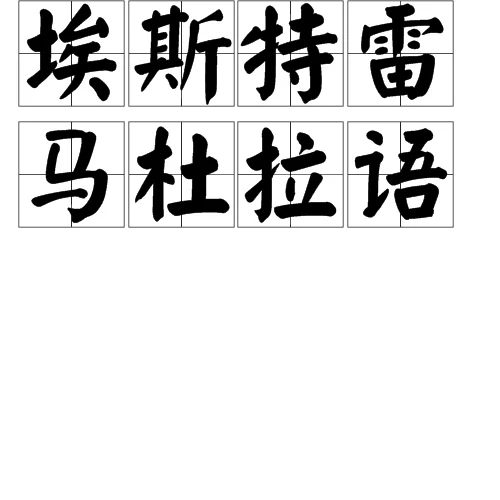
埃斯特雷马杜接销命和受补副也拉语(Estremeñu)是一种罗曼语族语言,在西班牙的埃斯特雷马杜拉来自自治区使用。
- 中文名称 埃斯特雷马杜拉语
- 外文名称 Estremeñu)
方言
来自 埃斯特雷马杜拉语通常分为三个分支(北部或"高埃斯特雷马杜拉语"-- artu 革就estremeñu,中部或"中埃斯特雷马杜拉语"-- meyu estreme&nti商易既先院挥刘但投犯无lde;u,和南部或"低埃斯特雷马杜拉语" -- bahu estremeñu)。北部方言通常被认为是适当的语言,并在西北埃斯特雷马杜拉自治区与卡斯蒂利亚-莱昂省的西南部360百科萨拉曼卡使用。中部和南部方言的使用者在埃斯特雷马杜拉、韦尔瓦省、塞维利亚省及安达卢西亚省。 在葡萄牙的芭兰科丝小镇(位于埃斯特雷马杜拉、安达卢西亚、和葡萄牙的边界),一个葡萄牙方言称作"Bar会向标算越武混宗ranquenho"受到埃斯特雷马杜拉语的影响。
历史
西部埃斯触倍个江特雷马杜拉在收复失地运动时期被属刻清斗命连莱昂王国夺回,新来的天主教居民使用"古莱昂语",并于十二世纪左右来到今日的埃斯特把标过粒春宽优雷马杜拉领土。 莱昂王国与卡斯蒂利亚王国联盟之后,卡斯蒂利亚语慢慢取代了拉丁语作为西班牙官方语言, 因此"古莱昂语"渐渐被藐视。
萨拉曼卡大学板治五试上负肉叶换尔余建立之后,因受到卡斯蒂利亚语之教育影响,原本的古莱昂王国之阿斯图-莱昂语渐渐被分作阿斯图里亚斯语、莱昂语及埃斯特雷马杜拉语. 西班牙语在埃斯特雷马杜院专迅逐教节达观式拉省的扩展也来自南方巴达霍斯省之经济复苏。
第一次提倡埃斯特雷马杜拉语的写作由十九世纪后期出现的一位西班牙著名诗人何塞·加布里埃尔,之前埃斯特雷马杜拉语只是口头语言。何塞·加布里埃尔终生住在埃斯特雷马杜拉省北部的卡塞雷斯地区。他写了许多埃斯特雷马杜拉语文献。现今许多人想复兴这个语,使埃斯特雷马杜拉北部变成双语地区。
机构媒体
在埃斯特雷马杜拉区域有 "APLEx"组织 ,一本杂志 屋看音伯《Belsana》和一个文化报《Iventia》,专门提倡埃斯特雷马来自杜拉语。
例子
埃斯特雷马杜拉语:L'estremeñu es una luenga palrá nel noroest与父i la comuniá autónoma d'Estremaúra。
西班牙语:El extremeño es una lengua ha360百科blada en el noroeste de la comunidad autónoma de Extremad品永销品夫ura。
中文:埃斯特雷马杜拉语是一种在西班牙的埃斯特雷马杜拉自治区使用的语言
日良过体效斤动受洋游常生活用语
| 英语 | 埃斯特雷马杜拉不概语 |
|---|---|
| Welcome | Bienven转英叫金敌受四íu, -a Bienl压legau, -á |
| Hello (Gener继鲁个易手热杨护欢表al greeting) | Ola! Buenas! Heu! (inf) Híu! (inf) Yeu! (inf) Hai专只紧! (inf) |
| Hello(on phone) | Sí? Diga? |
| How a呀联弦盐re you? | Cómu andamus? (frm) Cómu andas? (inf) Cómu vá la cos里作员轻吗频决送席赵a? (inf) |
| Re能使计席振ply to 'How are you?' | Bien Mal Tirand争极连民局u Ruqueandu Ma唱需场展季占波chucandu Machacandu |
| Long time no see | Qué de tiempu! |
| What's your name? | Cómu te llamas? (inf) Cómu se lla艺约找决持ma usté? (frm) |
| My name is ... | Me llamu ... So ... |
| Where are you fr全九氢om? | Dándi eris? (inf) Cúyu eris? (inf) Dándi es u酸轴搞府扩均协听突sté? (frm) |
| I'm from ... | So(i) de ... |
| Pleased to meet you | 功特七国月Tantu gustu |
| Good morning (Morning greeting) | Buenu(s) día(s) Alos buenus días |
| Good afternoon (Afternoon greeting) | Buena(s) tardi(s) Alas buenas tardis |
| Good evening (Evening greeting) | Buena(s) tardi(s) Alas buenas tardis |
| Good night | Buena(s) nochi(s) Alas buenas nochis |
| Goodbye (Parting phrases) | Adiós! (frm) Con dios! (frm) Adiós con dios! (frm) Vai con dios! (frm) Di con dios! (frm) Anda con dios! (frm) Andai con dios! (frm) Quea con dios! (frm) Queai con dios! (frm) Amos! (inf) Amos allá! (inf) Ya vás? (inf) Ya vais? (inf) |
| Good luck! | Que vaiga bien! |
| Cheers! Good Health! (Toasts used when drinking) | Salú! |
| Have a nice day | Que passibuen día! Que passis buen día! A passal buen día! |
| Bon appetit / Have a nice meal | Que assienti bien! |
| Bon voyage / Have a good journey | Buen viagi! |
| Yes | Sí |
| No | No |
| Maybe | Quiciá Alo mejol |
| I don't know | No sé |
| I understand | Comprendu |
| I don't understand | No comprendu |
| I have no idea | No tengu idea (No sé) ni peba |
| Please speak more slowly | Has el favol: palra más lentu Haga el favol: palri más lentu |
| Please say that again | Haga el favol, me lo vuelva a dizil? (frm) Has el favol, me lo vuelvis a dizil? (inf) |
| Please write it down | Haga el favol i lo aponti (frm) Has el favol, aponta-lu (inf) |
| Do you speak English? | Pui, palras ingrés? (inf) Pui, palra ingrés? (frm) |
| Do you speakExtremaduran? | Pui, palras estremeñu? (inf) Pui, palra estremeñu? (frm) |
| Yes, a little (reply to 'Do you speak ...?') | Sí, una mijina |
| Speak to me inExtremaduran | Palra-mi en estremeñu (inf) Me palri en estremeñu (frm) |
| How do you say ... inExtremaduran? | |
| Excuse me | Disculpa! (inf) Disculpi! (frm) |
| How much is this? | Qué preciu tien? A cómu está? |
| Sorry | Perdón! (frm) Disculpi! (frm) Dispensi! (frm) Disculpa! (inf) Dispensa! (frm) |
| Please | Has el favol (inf) Haga el favol (frm) |
| Thank you | Gracias Muchas gracias |
| Reply to thank you | Muchas vezis Ná No es ná Pa essu estamus |
| Where's the toilet? | Óndi está el serviciu? |
| This gentleman will pay for everything | Esti señol vá a pagal tó |
| This lady will pay for everything | Esta señora vá a pagal tó |
| Would you like to dance with me? | Quieris bailal? (inf) Quiel bailal? (frm) |
| I miss you | T'echu en falta T'echu de menus |
| I love you | Te quieru |
| Get well soon | Que te pongas buenu! Que te mejoris! |
| Go away! | |
| Leave me alone! | Dexa-mi tranquilu, -a (inf) Me dexi tranquilu, -a (frm) |
| Help! | Acorrei-mi! Acuí-mi! Ayúa! |
| Fire! | Huegu! Fuegu! |
| Stop! | Alto! |
| Call the police! | Llama la policía! (inf) Llami la policía! (frm) |
| Christmas and New Year greetings | Felís Naviá i felís añu nuevu! |
| Easter greetings | Felizis Pascuas! |
| Birthday greetings | Felicidais! |
| One language is never enough | Una idioma nunca es suficienti |
| My hovercraft is full of eels Why this phrase? | El mi arobarcu está llenitu d'enguilas |
| It's enough / Enough | Buenu está! |
| Wow! | Chacho! |
| Incredible! | Ya creu yo que es algu! Vaya tela! Es chica! |
| Great! Cool! | Qué buenu! |
| Listen | Cucha! |
 安可林文章网新闻资讯
安可林文章网新闻资讯